How Can You and I Change Stereotypes?
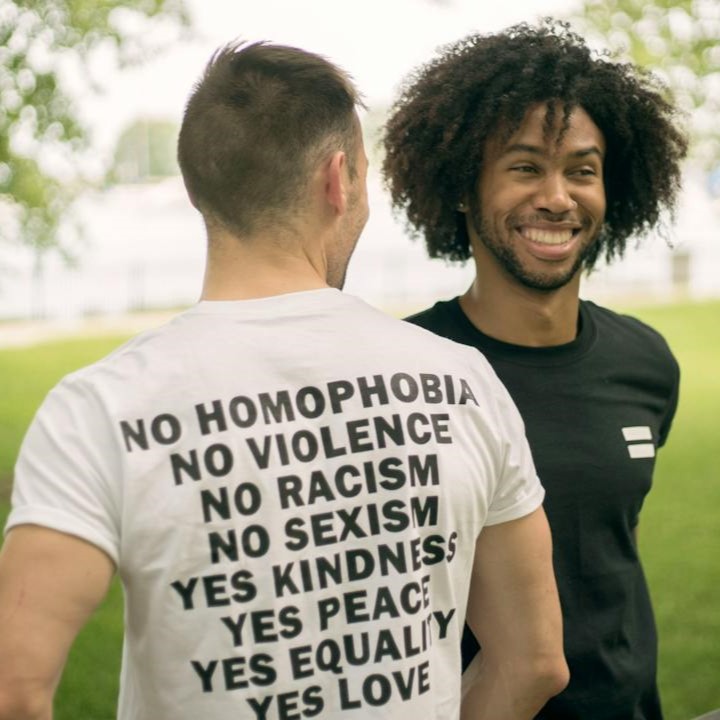
Table of Contents
A White People Phenomenon?
Recently, I saw a Reel on Instagram that inspired me to write this text about stereotypes. Unfortunately, I did not save it and cannot recall the name of the creator. So, a shoutout to unknown: Thanks for creating and sharing your content!
In the Reel, the creator speaks about how unlikely it is for white people to change their stereotypes of black people even if they encounter a black person who does not match their stereotypes at all. Instead of using an “outlier” data point as a trigger to reevaluate their view on black people, the creator said, white people simply form a NEW CATEGORY for this specific person (e.g. the “unlikely-black-person” category). Moving the outlier point to a new subset of data points conveniently solves the issue of having to change their existing stereotypes of black people in general.
If you consider yourself white and you feel resistance forming inside – e.g. in the form of disbelief, outrage, or protest – take a deep breath and read on.
If you consider yourself black / a person of colour and you are thinking “hell yes, that’s my experience” – your observation is very likely to be true.
However, it is not true because white people are intentionally stubborn. Neither is it true that this is a “white people phenomenon”.
It is a people phenomenon.
It is our psychology.
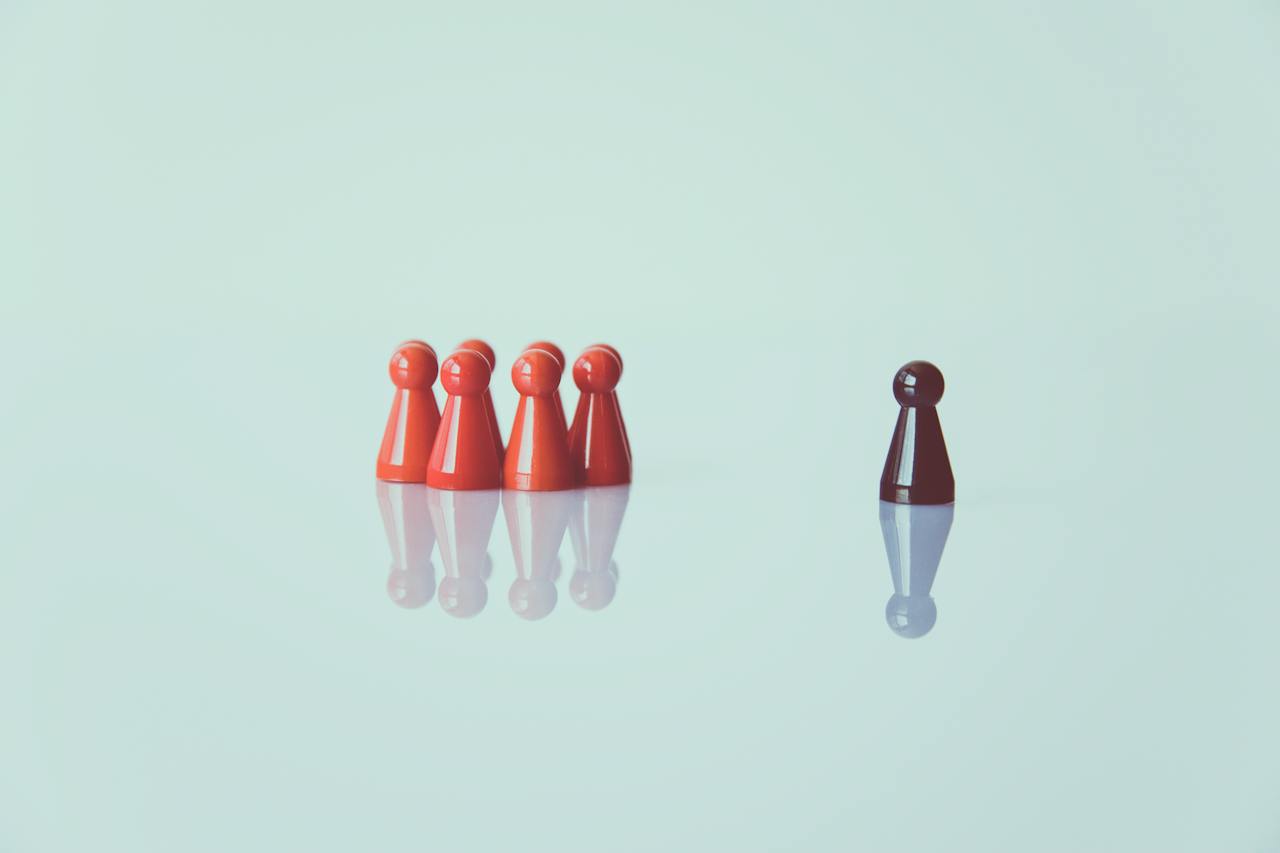
Can Stereotypes Be Changed Through Personal Contact?
Almost ten years ago (gosh, time goes fast…), I wrote my Bachelor’s thesis on the psychology of prejudice. To be more precise, on the question: How can stereotypes be changed?
This question intrigued me a lot since, starting at the age of sixteen, I had been volunteering as a facilitator of LGBTIQA educational workshops in schools. Me and my co-volunteers hoped to bust prejudices through education, to counter scepticism and hate through personal connection and empathy, and to help LGBTIQA teenagers feel safer in the classroom after breaking the taboo on all topics queer among their peers.
My personal experience taught me that getting to know a person of a certain sub-group (e.g. a lesbian, or a trans person) tends to increase our empathy with that person and to help us see that, in the end, we have more things in common than we have differences.
Starting this research project with hopeful enthusiasm, I soon found myself disheartened. The prevailing literature on the matter did not quite reflect my uplifting personal experiences in the classroom.
Why Are Stereotypes So Resistant to Change?
“There is nothing so obdurate to education or criticism as the stereotype.” (Lippmann, 1922)
What is a stereotype anyway?
Cambridge Dictionary defines a stereotype as ”a set idea that people have about what someone or something is like”. In other words, a stereotype is a set of beliefs about this group of people. These beliefs do not necessarily have to be negative, they can also have a positive association. Example: “Older people are more trustworthy than younger ones”, “Chinese people are always polite”.
Since there are other words we associate with the term “stereotype”, let’s look at its linguistic brother – the “prejudice”. Prejudice is defined as “an unfair and unreasonable opinion or feeling, especially when formed without enough thought or knowledge”. Prejudice is usually negative and informed by the prevailing stereotypes about the social group a particular individual is associated with.
Finally, stereotypes and prejudices can lead to discrimination, which can be observed as “treating a person or particular group of people differently, especially in a worse way from the way in which you treat other people, because of their race, gender, sexuality, etc.”

Back to stereotypes. Why do we have them in the first place?
There is a multitude of theories and research about the psychological value of having stereotypes. The most popular explanation is that they have economic value for us, in that they help us save mental processing power. We learn from society’s collective experiences, and, as we go through life, learn from our own. With a growing body of data points, we start deducting patterns and applying them to new situations. The more we refine our predictive models, the less energy we have to spend on judging a situation and defining our course of action.
Many of us think of ourselves that we possess a good sense for people, and that we can make out someone not worthy of our trust from a distance. We call it “gut feeling” and we cannot tell what exactly tips us off. Is it something about a person’s body language, their eye movement when speaking, their clothing?
As with every simplification, reducing people to patterns is as economic as it is error-prone. Once you are seen as part of a pattern, it is hard to break free from all the aspects a person associates with you, associates with the pattern, consciously or unconsciously. We are stuck inside a stereotype.
And stereotypes are sneaky little buggers that indeed have a very clever self-defence mechanism. Every new information that is not consistent with a prevailing set of beliefs about a certain group of people will automatically be flagged as an “outlier” and “not representative of that group”. Hence, it is not used to challenge the existing image of that group. Instead, the counter-stereotypical individual is neatly segregated into a new group or sub-group (Gershman & Cikara, 2021).
Just like the black person who does not meet a white person’s image of black people (whatever that might be).
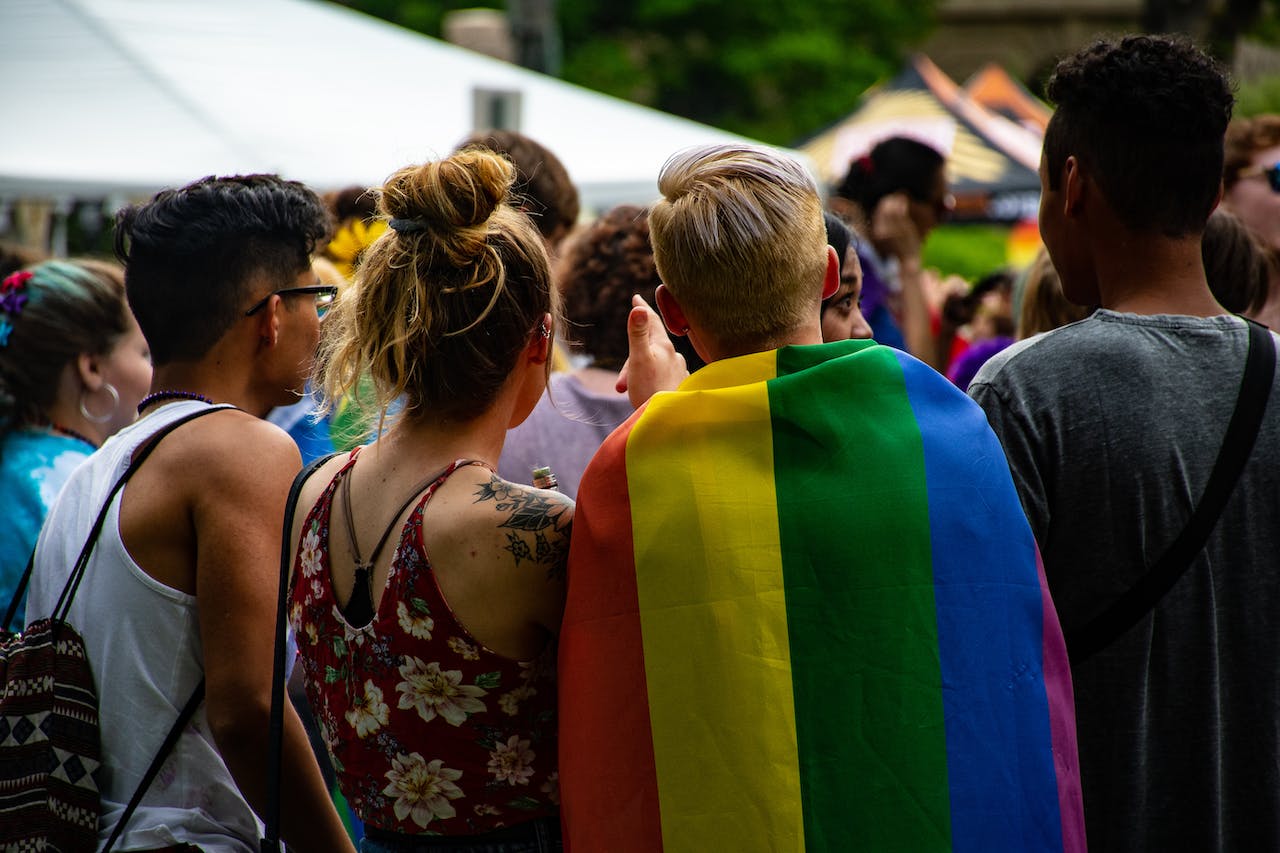
“What Are You?”
Back to my personal experiences in the classroom.
Yes, more often than not, I felt like the students attending our workshops left with a more differentiated opinion of LGBTIQA people. But… did they really change their stereotypes of queer people in general, or rather of us facilitators – representing the spectrum of the rainbow – in particular?
The workshops were always a mix of educational facts and personal stories shared by the facilitators. The latter did not require that we disclose our personal identities down to the details. As a result, there was plenty of space for projections coming from the workshop attendees. It often made me chuckle how – guessing from their comments and questions – the group would seemingly categorize me or react surprised by my not fitting the category they chose for me.
Sometimes, I would serve as a canvas on which to paint the picture of a non-typical lesbian (Long hair! Wearing make-up! No lumberjack shirt!), sometimes that of an inconspicuous transgendered woman (Doesn’t look like a drag queen! How expensive might those boobs have been?), at other times I was the bi person that did not fit the boys’ fantasies (Doesn’t have a boyfriend AND a girlfriend!).
Breaking with expectations and expanding people’s worldviews is fun! But will that effect last past the next person who is associated with an “OTHER” group?
Can Stereotypes Be Changed at All?
Fortunately, we are not doomed to bathe in the same stereotypes about the same social groups forever and a day. In fact, stereotypes do change… over time.
For example: What we believe about women, their capabilities and their place in the world is not the same as what was believed about women two hundred years ago, or even fifty.
One woman engaging in counter-stereotypical behaviour might lead us to exclude her from the general category of “women”. But experiencing many women around us doing jobs considered “manly”, or showing interest in things or acting in ways “not feminine” might just change our idea of “woman” ever so slightly, but steadily.
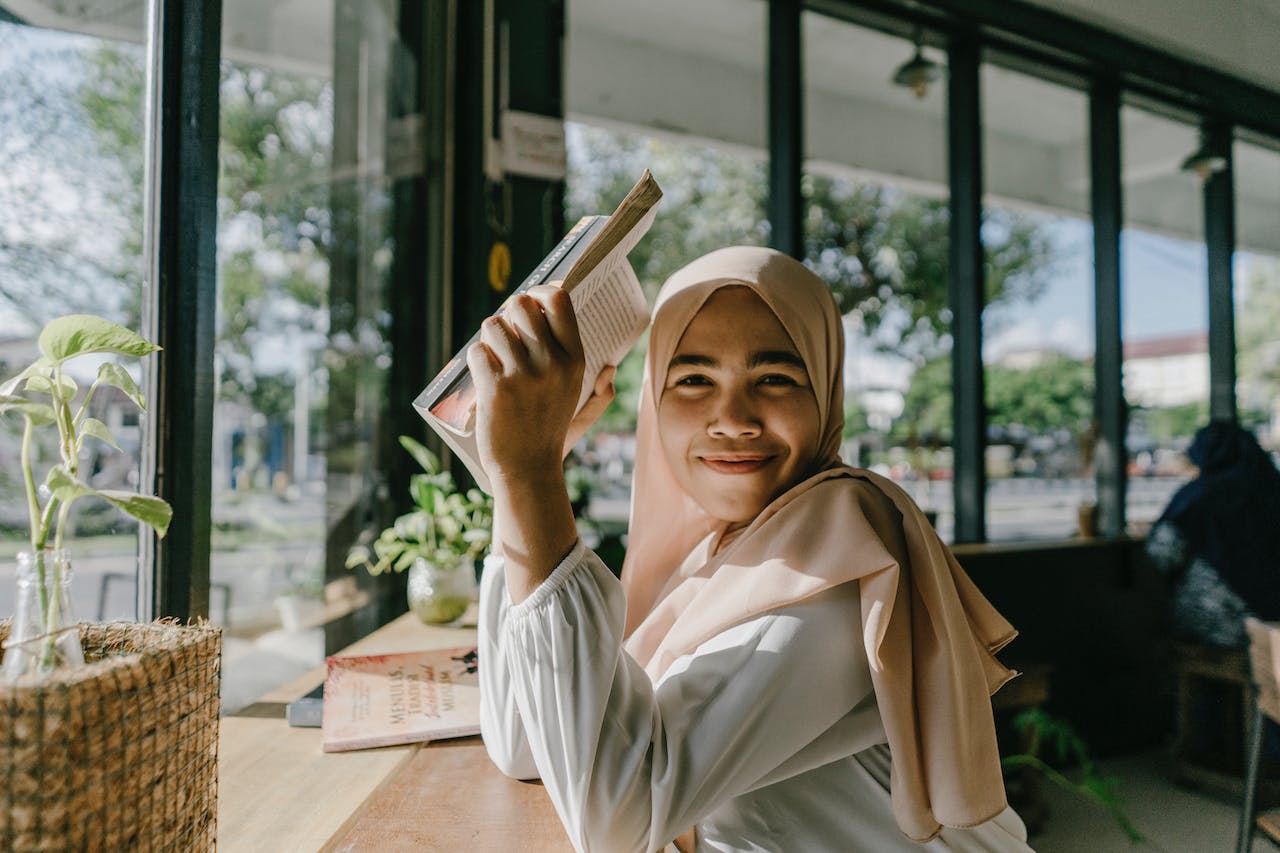
If you have a nerdy, math-savvy side to you, you might want to read up on this interesting research by Bhatia & Bhatia (2020), for which language analysed for changes in gender stereotypes over time.
Of course, the prospect of having to wait a generation or two to see things change can seem rather depressing. Sixty years after Martin Luther King’s “I Have a Dream” speech, another generation fights to break free from the expectations white people have of black people. And another piece of text written by a white person (me) is trying to make sense of why things do not seem to change.
Well, they do. But they do slowly. And while stereotypes change, there will always be a status quo of stereotypes. Back to the definition at the beginning, there will always be a set of beliefs about a group of people.
How Can You Help Change Stereotypes? And Why Is This a WHYLD Topic?
You might not be able to change a stereotype all on your own.
If you are a masculine-appearing gay man who is not interested in cutting someone else’s hair, does not know a thing about colour schemes for interior design, and is not some straight woman’s best friend, well… I am sorry, you simply did not make the cut for the “typical gay guy” team. Your not-so-queer-friendly neighbour might find you acceptable (“I have no problem with THIS one”), but you will probably not change his mind about some of your gay friends.
We all are put into boxes, all day long. When I walk a street where some environmental activist NGO is campaigning for supporters and donors, it is certain I will be targeted. When they look at me from afar, they see “young enough to have certain political views but not too young to lack financial means for donations”, “female-looking and thus likely to stop and listen, for people-pleasing purposes”, “no make-up and pragmatic clothing, thus probably interested in the outdoors” et cetera, et cetera.
And we all fall out of our boxes all the time. We are – supposedly – too loud for a sweet young lady, too cultivated for a black man, too frivolous for an elder person. In other words, we are being ourselves, not knowing (or caring) that we do not check the boxes at all times.
Being ourselves, our whole selves, being visible, being present, is what we can contribute to making the boxes we are shipped in wider and more comfy over time.
If not for us, then at least for the generations to come.
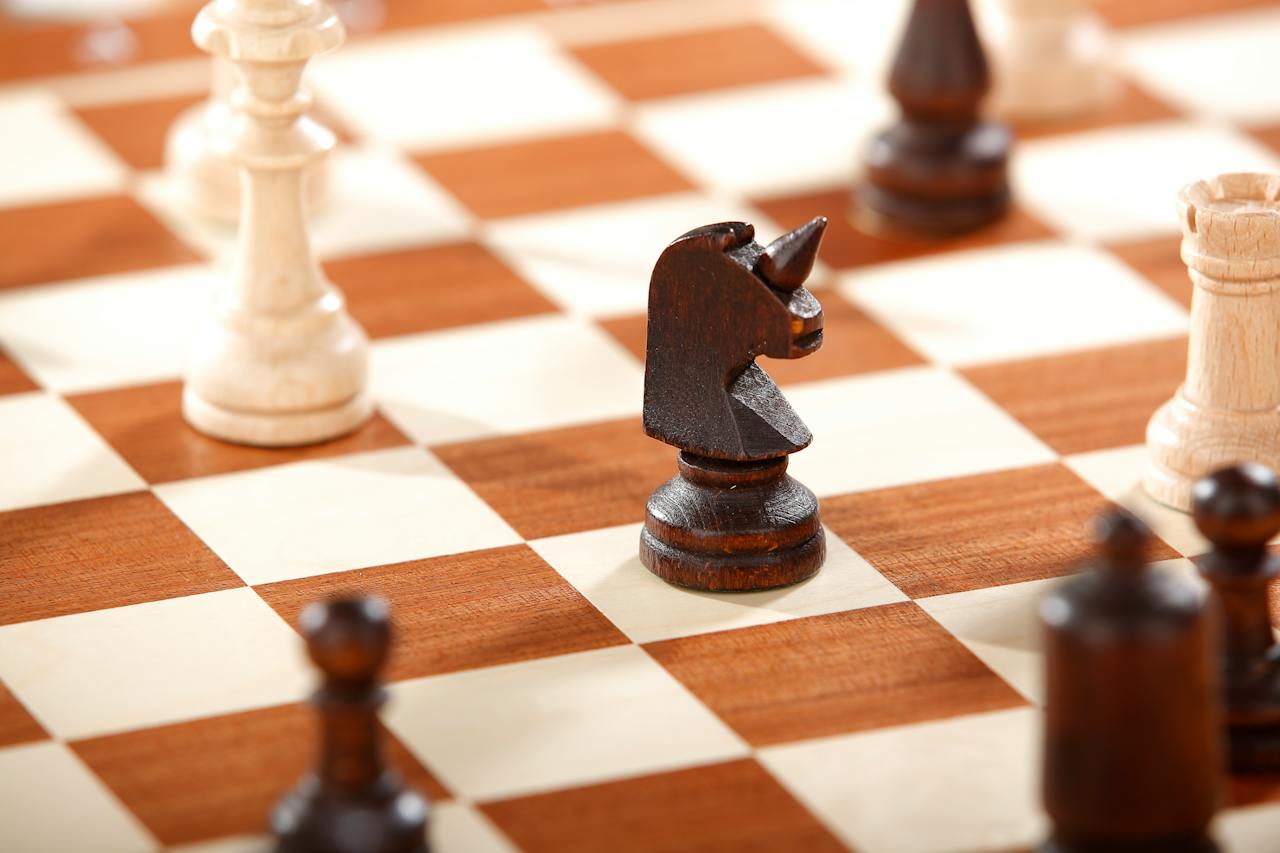
You do not have to be a walking-talking unicorn to kick in walls and create more space for us in society (though, dear unicorns, I love you, and it’s wonderful you exist!)
Even if you think you are completely “normal”, unprepossessing, or even “boring”… you are a unique combination of traits and behaviours and stories to tell. And through every interaction, you help corrode a stereotype ever so slightly.
Thus, just be yourself and let yourself be seen. Offline and online. You have an impact!
Your Turn: What Can You Take Away From This?
TRY to challenge your generalisations & inferences in everyday life situations:
- Do you know a person is a certain way or do you just assume it?
- Have you seen evidence to the contrary?
- What are the consequences of you believing a person is a certain way?
- What does it keep you from doing or experiencing?
- How could your assumptions harm the other person?
Scientific Resources
Bhatia, N., & Bhatia, S. (2020). Changes in Gender Stereotypes Over Time: A Computational Analysis. Psychology of Women Quarterly, 45(1), 106-125. https://doi.org/10.1177/0361684320977178
Gershman, S. J., & Cikara, M. (2021, August 25). Structure learning principles of stereotype change. https://doi.org/10.31234/osf.io/52f9c
Lippmann, W. (1922). Public Opinion Harcourt, Brace and Company. New York.
photos: Brett Sayles, Madison Inouye, Markus Spiske, Nicholas Swatz, Schach100 & Umar ben via Pexels
Subscribe
Login
0 Comments
Oldest
Newest
Most Voted
Inline Feedbacks
View all comments